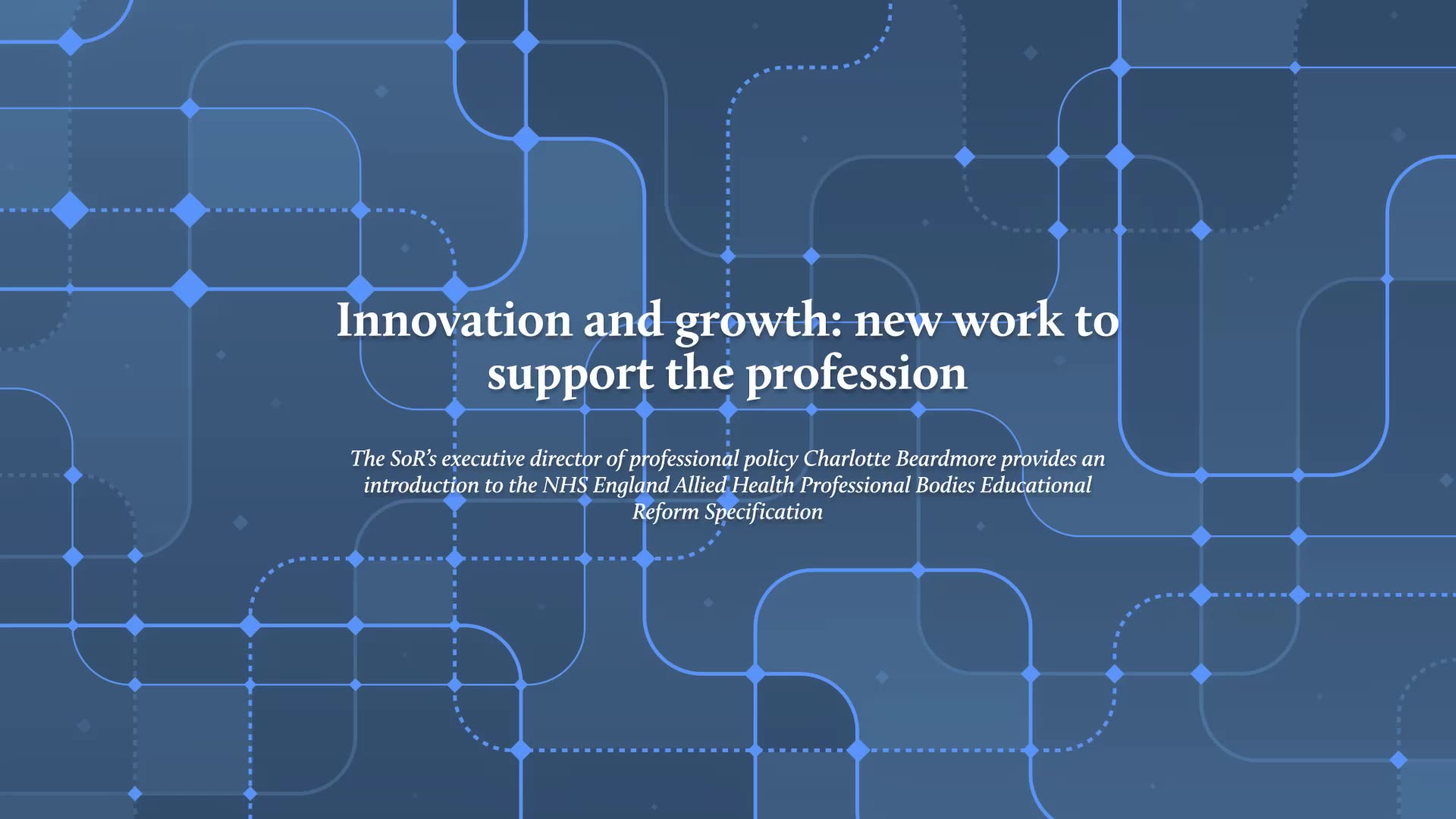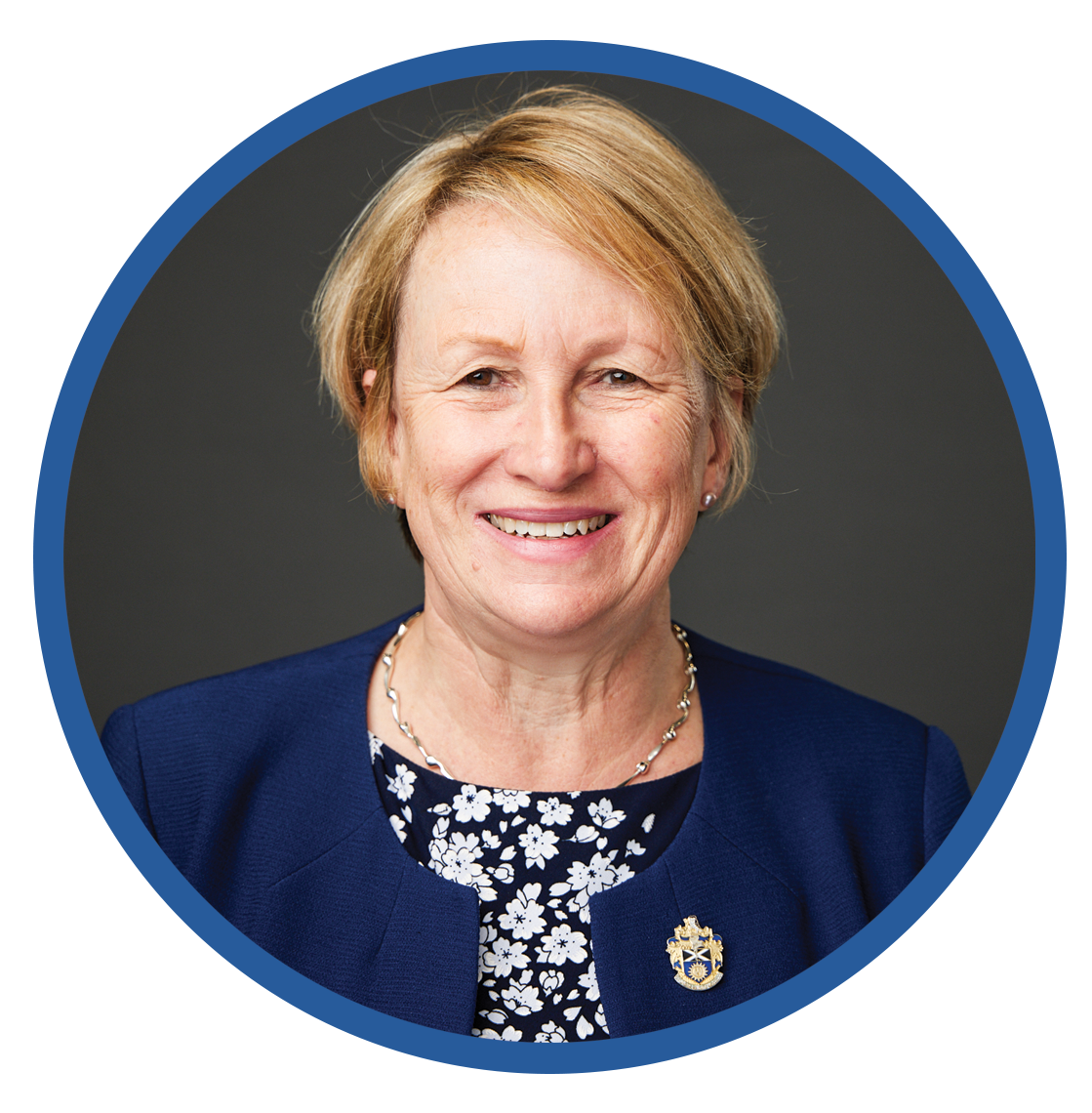

Charlotte Beardmore
Charlotte Beardmore
The Society of Radiographers has been offered an exciting and ambitious contract of work by NHS England Workforce Training and Education (WTE) to deliver a series of projects over the coming year.
NHS England state: “Professional organisations are pivotal to providing professional Allied Health Professions (AHP) workforce advice, expertise and assurance to NHS England work programmes across England, including workforce planning, careers, primary care workforce, attrition, elective recovery and advancing practice. They support detailed, data-driven, system-facing workforce conversations across the 14 individual health professions and can advise on specific interventions whilst considering profession-specific nuance.”
The ambitions within the contract support the drivers contained within the NHS Long Term Workforce Plan, the NHS People Plan, AHP Delivers Strategy and Framework 15. The NHS England National AHP programme (WTE) has the responsibility to ensure an effective supply of AHPs, ensuring robust deployment and development of staff and places a focus on the retention of staff, across professions and geographies. The goal is to ensure the right workforce, with the right skills, is in the right place to deliver high-quality care.
We know the imaging and radiotherapy workforce must continue growing to meet the increasing demand, and we know that in order to retain skilled workforce there must be opportunity for CPD, for education and training at all levels of practice, and therefore we are pleased to be supporting this contract of work which covers key areas to recruit, retain and reform the radiography workforce (see full plans for this in our Radiography Manifesto.)
It is really helpful that we have recently published the Education and Career Framework (ECF) for the imaging and oncology workforce. Encompassing all levels of practice from support worker to those in advancing practice roles including educators, researchers and clinical academics, this framework underpins clinical practice and also recognises the importance of leadership, education and research at all levels of practice. Many of the contract priorities link through to the ECF.
The contract requires the SoR, its members and wider stakeholders to engage on the following workstream topics. I will go through each in a little more detail in the section which follows:
- Creating the climate to maintain supply
- Support workforce
- Preceptorship
- Educator workforce (academic and clinical)
- AHP Careers
- Career Development framework and Pathways
- Additional areas of work
1. Creating the climate to maintain supply

Our activity here will focus on supporting high quality placement innovation and growth in learning environments and includes additional case studies to reflect members developing roles within our Education and Career Framework, a review of clinical current placement hours across our the College of Radiographers-approved programmes, to consider the role of simulation in diagnostic radiography and to scope if there are standardised assessments being developed across regions in the UK.
2. Support workforce

Within clinical imaging this section of work will focus upon optimising the contribution of the diagnostic radiography support and assistant workforce:
- To scope and define whether there is a need for occupationally specific competency guidance and, if so, to develop that guidance
- To produce resources to support safe and effective delegation.
- To undertake a training needs analysis and identify any gaps in the provision of formal education. Where gaps exist identify potential means of meeting training needs
- To model how apprenticeships might be more extensively mobilised for the radiography supportive and assistive workforce.
- To work with services to understand and model how engagement with local employment and skill systems could enable inclusive recruitment, workforce diversity and widening participation.
- To consider the scope for (i) the development of new Assistant Practitioner roles and (ii) the opportunity to spread adoption of existing Assistant Practitioner roles.
Within radiotherapy to build capacity and capability in the therapeutic radiography support and assistive workforce:
- To produce a guide setting out the roles and responsibilities (scope of practice) of the support and assistive workforce employed at Band 2, 3 and 4. The guide also recommends minimum education and entry requirements at each level.
- To identify gaps, barriers, constraints and enablers that might inhibit implementation of the guidance locally and produce recommendations of how issues might be addressed.
If you are interested in contributing to these workstreams please keep an eye on future editions of Synergy and SoR.org. Find out more about the SoR’s work delivering two new NHS England-commissioned projects aligned to the national NHS England Allied Health Professions support workforce strategy here.
3. Preceptorship in Radiography: Cross-sectional scoping of profession specific needs

The Society and College of Radiographers has been involved in the work the Health and Care Professions Council (HCPC) and NHS WTE has led in supporting a framework for structured preceptorship for the AHPs. As part of this work, we aim to provide guidance to support implementation of preceptorship for the profession. This will include the setup of a radiography preceptorship steering group to support the delivery, collection and analysis of data relating to:
- The early career period/preceptee for the radiography profession, including availability and structure of preceptorships and possible impact on retention
- To identify preceptor needs, requirements and capacity
- To understand profession specific service needs and requirements in relation to preceptorship
This work will support the development of profession specific recommendations which complement the HCPC AHP Preceptorship Principles and NHSE Preceptorship Standards and Implementation Framework, and a learning needs analysis mapping tool will be published.
4. Educator workforce

Our goals with this section of the work are:
- To continue to support and grow engagement with Radiography Educators supporting regular meetings and educators work streams at the following events in 2024: Annual Radiography Educators conference, UKIO and the Annual Radiotherapy Conference
- To collaborate across professional groups on the development of a best practice guide for growing educator capacity and capability
- To develop a practice educators' network, and associated resources to support educators
- To promote and develop the PEAS scheme with writing retreat and network
- To publish more case studies to promote educators' roles within the ECF and promotion of careers within the ECF
5. AHP Careers

We will plan to expand our presence at a range of career outreach events during 2024-25, to develop enhanced and expanded outreach/ learning resources targeted to different audiences and to create bespoke content, creating virtual reality tools and marketing materials.
6. Career Development Framework

The funding supports work for all levels of practice and in addition to the support workforce priorities we are going to focus on the following:
For Students
- To develop CPD content and support events
- Development of Point of Care Foundation Facilitators
- Engagement with the development of the NHS WTE AHP pre-registration student hub
To support enhanced-level practice
- Socialisation of enhanced practice
- Scoping of education provision/planning across HEIs and service
To support the growth in advanced-level practice
- To review the Scope of practice for the profession and the advanced practice role considering both traditional roles within imaging and oncology but also provide guidance for new roles which require radiographer registration but which maybe outside these traditional areas of practice for the profession.
- Alongside this to undertake a review of our code of conduct for SoR members.
- Our third goal is to undertake a project to align the CoR postgraduate programme approval with CoR advanced practitioner recognition.
To support Consultant practice
- Continue to grow and develop the consultant radiographers’ network and to develop resources that promote and showcase inclusivity at a consultant level.
7. Additional areas of work

- Project one is focused upon scoping practice education requirements to support sonographers.
- Project two is to offer mentorship training to members of the profession to include educators and academics.
What have we done so far?

To date, we have finalised the project plan, and are in the process of appointing a number of expert providers to deliver some of the projects. A part time project manager and administrator will be helping support this work.
External contracts have been awarded for the following projects:
- Review of the Scope of Practice and Code of Conduct
- Role of Simulation in Diagnostic Radiography
- Understanding and scoping the preceptorship requirements of the profession
- Socialisation of enhanced practice
- Mapping of enhanced, advanced and consultant educational programmes
- Supporting the growth and development of the support workforce
- Regional pilot of standardised assessment in pre-registration diagnostic radiography education and UK wide scoping
We are meeting regularly with NHS England, which monitors progress and we have detailed internal monitoring plans across all 28 projects.
Please watch this space for further updates and more information about how you can become involved in the wider workstreams.
Image credit: filo / Getty Images
Read more


